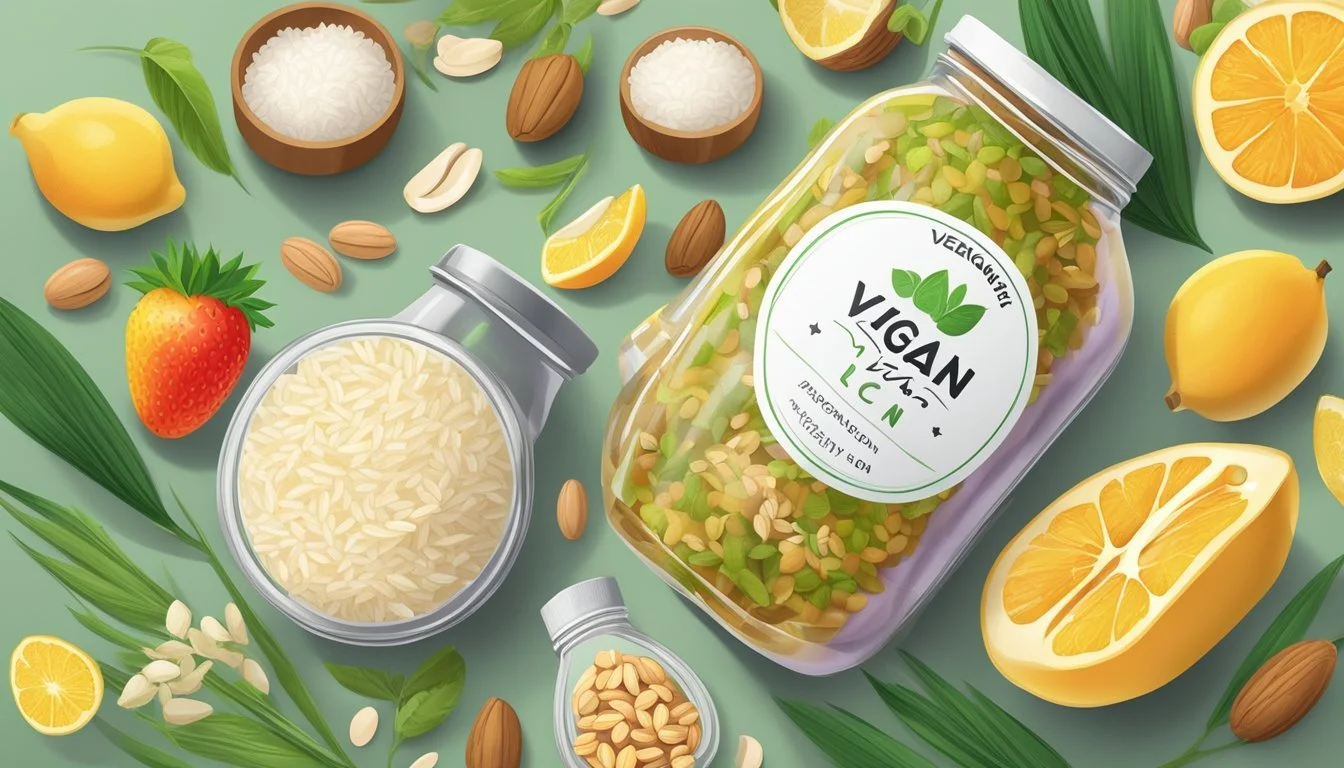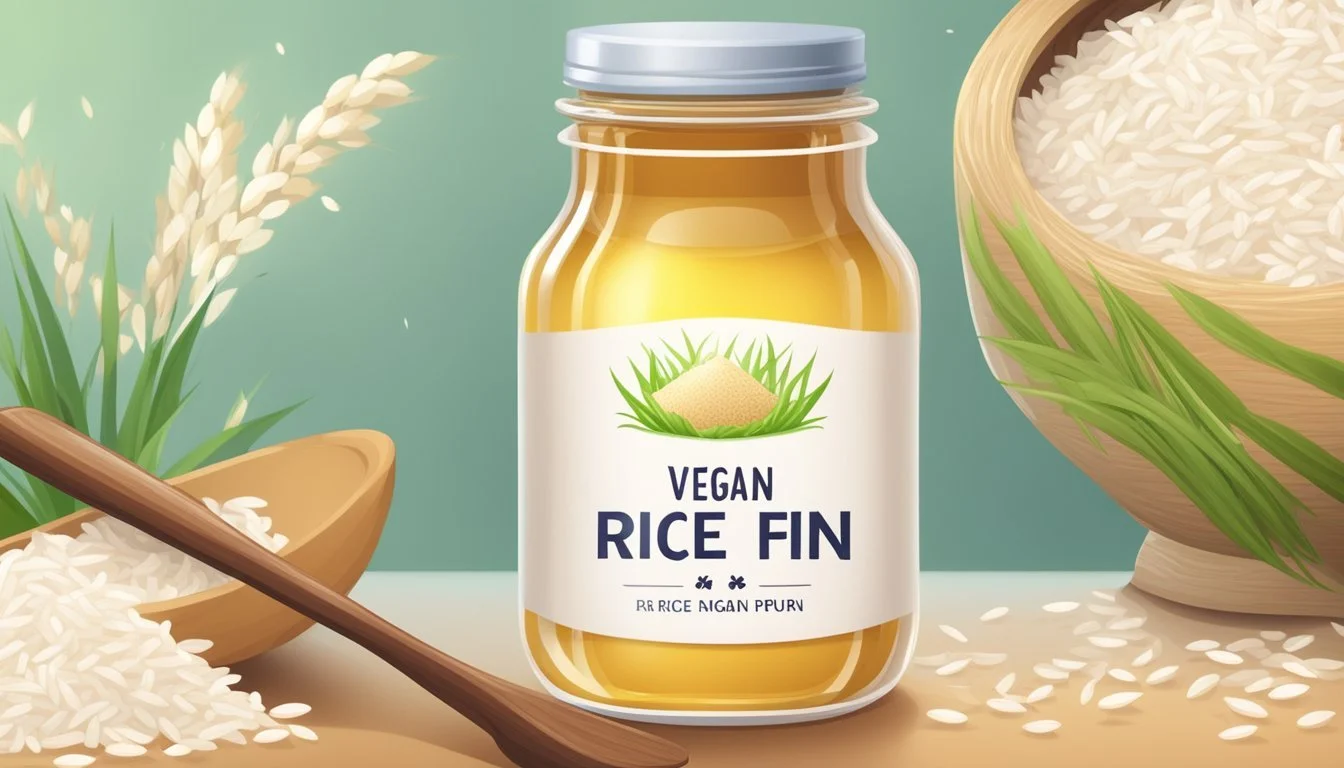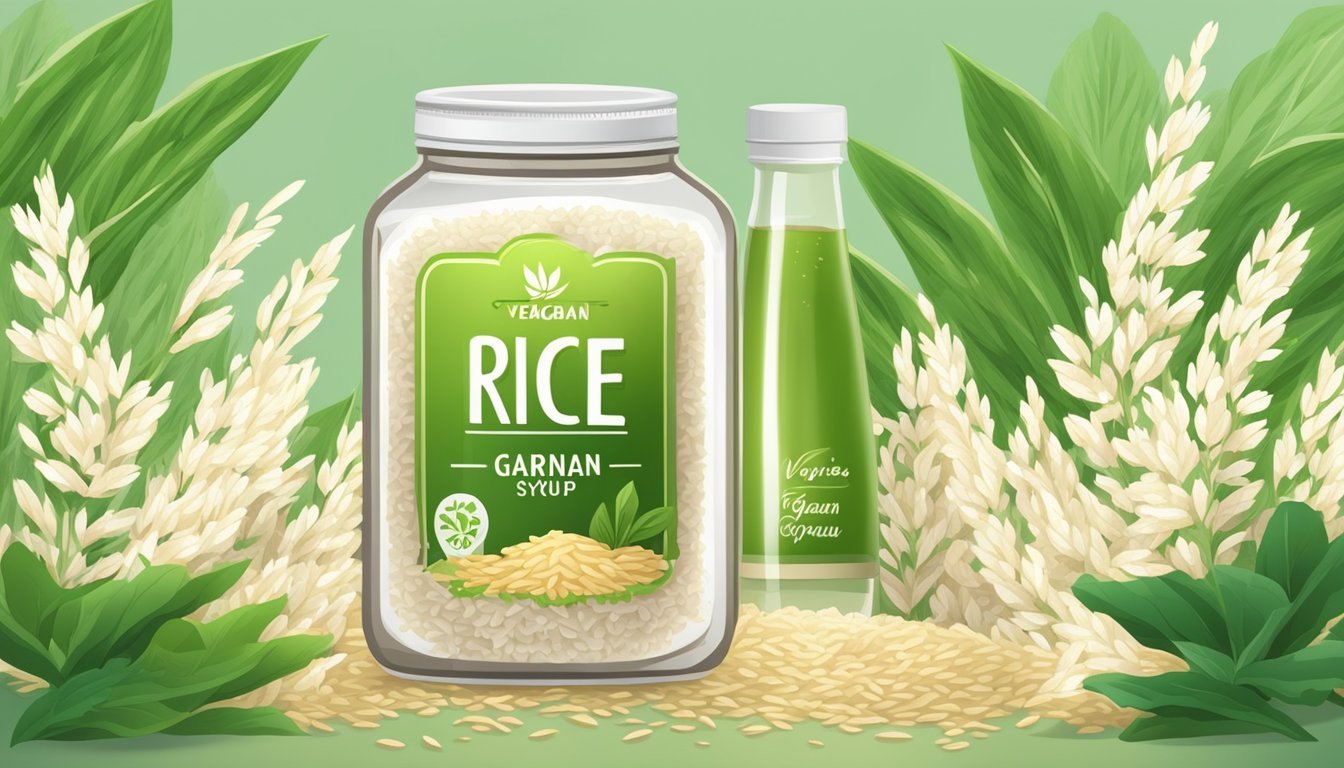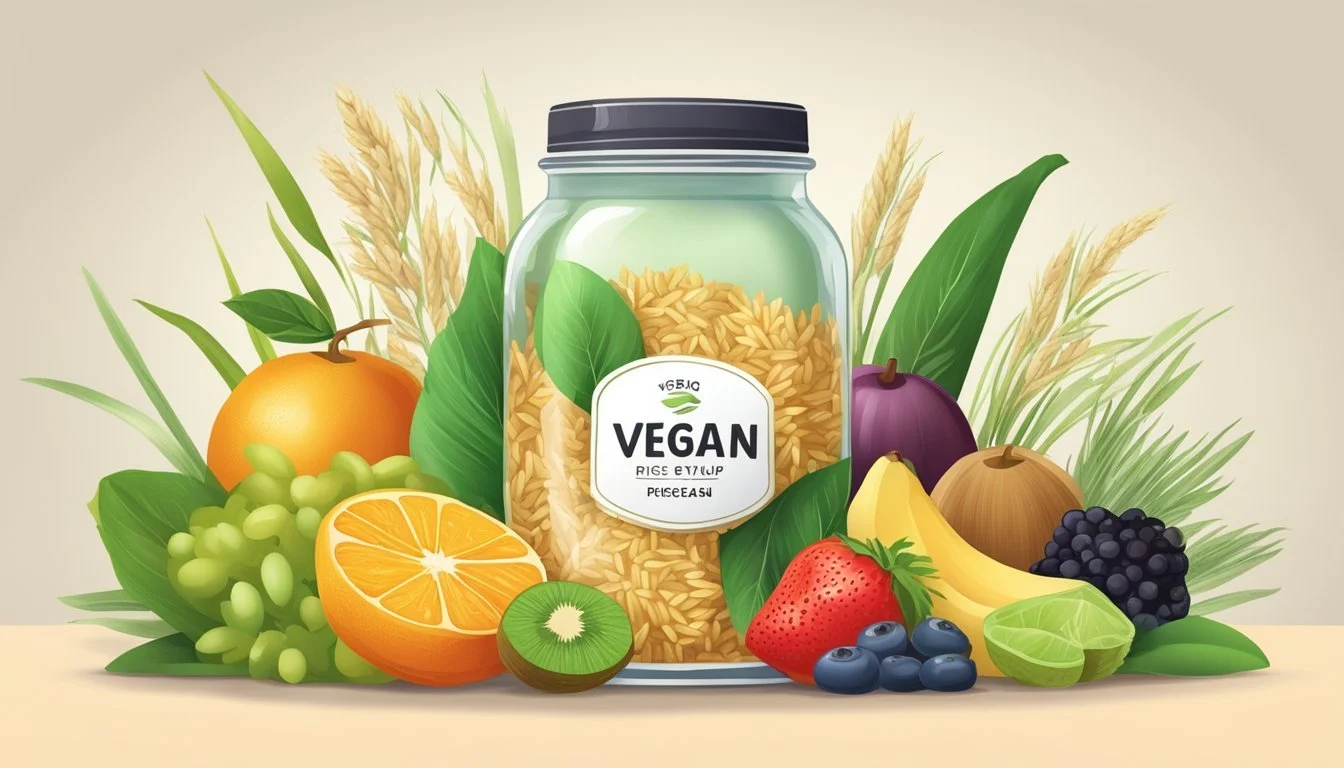Is Rice Syrup Vegan?
Uncovering the Sweetener's Plant-Based Status
Rice syrup, often referred to as rice (What wine goes well with rice?) malt syrup, is a sweetener derived from fermented cooked rice. As a plant-based product, it naturally fits into a vegan diet, which excludes animal products including dairy, eggs, and honey. The fermentation process breaks down the starches in the rice, resulting in a thick, sugary syrup. Rice syrup is favored in vegan cooking and baking as a substitute for honey and other non-vegan sweeteners.
Being a versatile ingredient, rice syrup serves various culinary purposes. It can be used to sweeten desserts, glaze foods, and enhance the flavor profile of many dishes without the inclusion of animal derivatives. As the vegan lifestyle emphasizes not only the absence of animal products but also the pursuit of a healthier diet, rice syrup is sometimes chosen over refined sugars, though it is important to note that it is still a form of sugar with similar caloric content.
Understanding Veganism
Veganism extends beyond diet, encompassing a lifestyle choice grounded in ethics and environmental consideration, with the exclusion of all animal products.
Defining Veganism
Veganism is the practice of abstaining from the use of animal products, particularly in diet, and an associated philosophy that rejects the commodity status of animals. A vegan diet involves all forms of food that are not derived from animals, including meat, dairy, eggs, and honey. It emphasizes whole foods such as fruits, vegetables, legumes, grains, nuts, and seeds.
Common Misconceptions About Veganism
Many believe that vegans do not obtain sufficient protein or that a vegan diet is inherently deficient in nutrients. However, vegans can achieve a well-rounded diet by carefully selecting a variety of plant-based foods. For example:
Proteins are found in legumes, nuts, seeds, and whole grains.
Calcium is abundant in fortified plant milks and leafy greens.
Iron is sourced from lentils, chickpeas, and tofu.
Ethical and Environmental Considerations
The ethical dimension of veganism is rooted in the belief that all sentient creatures have a right to life and freedom. Therefore, vegans oppose animal agriculture, which is often linked to animal cruelty and exploitation. Environmental considerations also play a significant role, as plant-based diets typically require less water and land resources and produce fewer greenhouse gases compared to diets including animal products. These aspects illustrate a collective vegan effort to reduce the impact on the planet while adhering to a morally conscious lifestyle.
Rice Syrup Overview
Rice syrup, a plant-based sweetener, has gained traction as a vegan alternative to traditional sugars. It is made from rice and comes in different varieties, including the popular brown rice syrup.
What Is Rice Syrup
Rice syrup is a natural sweetener obtained from the enzymatic treatment of rice, which breaks down the starches into simpler sugars, primarily maltose. This conversion results in a viscous, sweet syrup often utilized in various culinary applications as a sugar substitute. Unlike ixqsugar, which is a registered trademark sweetener, rice syrup is a generalized term for syrups derived from rice.
Rice as a Sweetener
Rice is not inherently sweet, but when processed into syrup, it becomes a potent sweetener. Rice syrup's main components are complex carbohydrates, which are broken down into a less complex form like maltose and some glucose. This sweetener offers a lower glycemic index compared to conventional white sugar but should still be consumed in moderation.
The Making of Rice Syrup
The production of rice syrup involves several steps. Cooked rice is exposed to enzymes that break down the starches into simpler sugars. These sugars are then filtered and reduced to create a thick, amber-colored syrup. Both enzymatic hydrolysis and the reduction process are crucial for achieving the desired consistency and sweetness level of the syrup.
Production Steps:
Cooking of rice
Enzymatic breakdown of starches
Filtration of liquid
Reduction to syrup
Rice Syrup Varieties
The most common types of rice syrup include white rice syrup and brown rice syrup.
White Rice Syrup: Derived from white rice, this variety has a more neutral flavor and color, making it a versatile sweetener.
Brown Rice Syrup: Made from brown rice, it retains more of the natural nutrients found in the hull of brown rice and offers a distinct malty flavor. It's known for its use in vegan and gluten-free recipes due to its plant-based origin and absence of gluten.
Both types serve as an important ingredient for those seeking alternatives to animal-derived or refined sweeteners.
Health Aspects of Rice Syrup
In considering the health implications of rice syrup, it is important to examine its nutritional content, how it affects blood sugar levels, and its role in a balanced diet.
Nutritional Profile of Rice Syrup
Rice syrup is primarily composed of complex carbohydrates that are broken down into simpler sugars during production, resulting in a substance that is nearly 100% glucose. The carbohydrate content is significant, however, rice syrup lacks fiber, vitamins, and minerals. In terms of caloric content, rice syrup provides about 300 calories per 100 grams.
Glycemic Index Comparison
The glycemic index (GI) is a measure of how quickly a food raises blood sugar levels. Brown rice syrup has a high GI of 98, which is comparable to glucose (GI of 100) and higher than table sugar (GI of 65). Foods with a high GI can lead to rapid spikes in blood sugar, which can be a concern for individuals managing weight or conditions like diabetes.
Rice Syrup in a Balanced Diet
Within a balanced diet, rice syrup can be used as a sweetener, but it should be consumed in moderation due to its high glycemic index and lack of essential nutrients. Regular consumption of high-GI foods may be associated with an increased risk of developing type 2 diabetes and heart disease. For individuals looking for sweetening options, alternative sweeteners with lower glycemic indices might be more suitable, especially for those with diabetes or those trying to manage their blood sugar levels.
Vegan Suitability of Sweeteners
This section examines the vegan-friendliness of sweeteners, focusing on rice syrup, common processing practices involving animal derivatives, and a comparison of plant-based sweetener alternatives.
Is Rice Syrup Vegan-Friendly?
Rice syrup, also known as brown rice syrup, is a sweetener produced by fermenting cooked rice with enzymes to break down the starches, then filtering and boiling it down to a syrup. This processing method does not involve any animal products, making brown rice syrup a vegan-friendly sweetener.
Animal Derivatives in Sweeteners
Some sweeteners, like refined sugars, may be processed using bone char, a charred animal bone, which helps achieve a white, purified product. However, vegan sugars are available that bypass this process. Maple syrup, agave nectar, molasses, and corn syrup are examples of vegan sweeteners, as these typically do not undergo refining with animal derivatives.
Comparing Vegan Sweetener Alternatives
When considering vegan substitutes for sweeteners with potential animal derivatives, it's important to compare alternatives. Here's a list of commonly used plant-based sweeteners:
Maple Syrup: Pure and unrefined, comes directly from plant sap.
Agave Nectar: Extracted from the agave plant, a preferred alternative to high fructose corn syrup.
Molasses: A by-product of the sugar refining process, rich in nutrients.
Corn Syrup: Derived from cornstarch, often used in baking.
Note: While honey is natural, it is not considered vegan due to the exploitation of bees in its production. Vegan individuals often seek substitutes like the ones mentioned above to ensure their dietary choices fully exclude animal products and by-products.
Culinary Uses of Rice Syrup
Rice syrup serves as a versatile sweetener suitable for various culinary applications, offering a mild, buttery flavor that complements both sweet and savory dishes. It stands as a favored ingredient for those seeking a plant-based sweetening option.
Baking and Desserts
Rice syrup can replace traditional sweeteners in baking recipes. Its consistency makes it particularly effective in creating chewy textures in granola bars, lending a subtle sweetness to pancakes, and maintaining moisture in baked goods. Desserts like waffles and ice cream can also benefit from its rich flavor, giving depth to toppings such as butterscotch.
Granola Bars: Use rice syrup for a chewy, satisfying bind.
Pancakes: Drizzle atop or incorporate into batter for a hint of sweetness.
Cookies and Cakes: Substitute for sugar to add moisture and delicate flavor.
Cooking and Savory Dishes
Rice syrup's gentle flavor profile allows it to blend seamlessly into savory dishes without an overpowering sweetness. It can add depth to sauces, glazes for proteins, and can be used as a subtle flavor enhancer in a variety of recipes that traditionally call for a touch of sugar.
Sauces and Glazes: A spoonful can balance the acidity or spice in recipes.
Marinades: Incorporate into marinades to promote caramelization during cooking.
Beverages and Breakfast
In beverages, rice syrup can sweeten coffee or tea without altering the drink's intended flavor. Its mild taste and solubility make it an ideal sweetener for liquids. For breakfast, it can be an excellent topping for cereal or natural sweetener in smoothies.
Coffee and Tea: Stir into hot drinks for a smooth, even sweetness.
Cereal: Drizzle over cereal for an added layer of flavor without refined sugars.
Smoothies: Blend with fruits for a wholesome, energizing breakfast option.
Choosing and Using Rice Syrup
Rice syrup is an attractive sweetener for those adhering to a vegan diet due to its plant-based origins and its versatility as a sugar substitute. When incorporating rice syrup into your pantry, it is important to consider quality, usage in vegan cuisine, and understanding its distinct flavor and texture profile.
Finding Quality Rice Syrup
When selecting a rice syrup, consumers should look for organic products to ensure they are free from pesticides. The label should confirm that natural enzymes are used for the conversion process from rice starches to sugar. Organic rice syrup indicates adherence to stringent agricultural practices, an important factor for many seeking pure vegan ingredients.
Incorporating Rice Syrup into a Vegan Diet
Rice syrup, as a natural sweetener, offers a vegan-friendly substitute for honey and can replace refined sugars in a variety of recipes. To use rice syrup effectively, consider its conversion ratio in comparison to traditional sweeteners:
For baking, 1 ¼ cups of rice syrup can replace 1 cup of granulated sugar with a reduction of other liquids in the recipe by ¼ cup.
It serves as an ideal addition to beverages, sauces, and dressings, where its mild, nutty flavor can complement other ingredients without overwhelming them.
Appreciating Taste and Texture Differences
Rice syrup provides a unique contribution to dishes with its flavor and texture. It possesses a less intense sweetness and a more complex, nutty flavor profile when compared to other sweeteners. The liquid sweetener has a thick, sticky consistency which adds to the mouthfeel of desserts and baked goods. Chefs and home cooks alike should be aware of the subtle differences in sweetness intensity and texture when substituting rice syrup in their culinary creations.
Consumer Considerations
When exploring the suitability of rice syrup as a vegan sweetener, consumers should consider not only its vegan status but also its nutritional profile and role in a balanced diet. It's important to assess sugar substitutes, understand moderation, and interpret product labels accurately.
Evaluating Sugar Substitutes
Rice syrup is a vegan-friendly sweetener derived from fermented rice. It contains primarily glucose, making it a popular alternative to refined sugars for those seeking plant-based options. However, as a processed food, it lacks significant amounts of essential nutrients found in whole foods. Consumers must measure the benefits of any sweetener against their health and dietary goals.
Vegan-Friendly: Brown rice syrup is typically free of animal products.
Gluten-Free: Often chosen by those with gluten intolerances, though cross-contamination is possible.
Refined Sugars: Lacks fructose; seen as a lower glycemic index alternative.
Nutritional Value: Generally low; contains trace minerals such as magnesium and B vitamins in small amounts.
Moderation and Dietary Balance
Moderation is key in the consumption of all sweeteners, including rice syrup. It's important for consumers to consider their overall sugar intake as part of a balanced diet, especially since high consumption of glucose can impact health. Rice syrup can be part of a vegan diet if used sparingly and not as a main source of nutrients.
Processed Foods: Rice syrup is processed; its consumption should be balanced with whole, nutrient-rich foods.
Sugar Intake: Integrating sweeteners thoughtfully into one's diet helps maintain dietary balance.
Deciphering Product Labels
Understanding product labels is essential for those seeking to maintain a vegan and health-conscious diet. Labels can confirm if rice syrup is free from animal-derived ingredients and if the product is all-natural or contains added ingredients. Consumers should look for certifications that align with their dietary choices.
Vegan-Friendly: Labels should indicate the absence of animal products.
All-Natural: Check for the presence of additional additives or preservatives.
Essential Nutrients: Evaluate the nutrient profile, acknowledging that rice syrup is not a significant source of nutrients.
Global Perspectives
The global use of rice syrup, often also referred to as rice malt or rice malt syrup, reflects diverse consumption patterns and a varied picture of production and availability. It is key to understand these trends within the vegan sweetener market, particularly in relation to its production in Asia, which is a significant source of this ingredient, and its consumption in markets like the United States.
Rice Syrup Consumption Trends
Globally, rice syrup is gaining traction as a vegan sweetener, with its use becoming more widespread in processed foods, baked goods, and beverages. In the United States, the increased demand for plant-based products has seen a rise in the inclusion of rice syrup in vegan recipes and manufactured food items. Its appeal stems from its status as a vegan alternative to honey and other non-vegan sweeteners.
Asia has been a longstanding consumer and producer of rice malt syrup. The traditional consumption in Asian countries has stood the test of time, mostly due to the availability of the core ingredient, rice, and cultural preferences for non-refined sweeteners.
Production and Availability Worldwide
The production of rice syrup primarily takes place in Asia, as the continent is the largest producer of rice globally. This region harnesses extensive rice paddies, leveraging the crop not only for culinary staples but also for derivatives like rice syrup.
Production Process: The syrup is produced by fermenting rice with enzymes to break down the starches, which are then strained off and reduced to a syrup.
The availability of rice syrup varies worldwide, with the ingredient being more accessible in regions with high rice production. In the United States, rice malt syrup can be found in health food stores and larger supermarkets, reflecting the country's burgeoning interest in plant-based diets and alternative sweeteners. However, it is competing in a robust market alongside other sweeteners like corn syrup, cane sugar, and agave nectar.
Conclusion
Rice syrup is indeed a vegan-friendly sweetener. It is derived from rice, a plant source, and involves enzymatic treatment to break down starches into simpler sugars. This processing does not utilize animal products, making it suitable for a vegan diet, which excludes meat, dairy, eggs, and all forms of animal exploitation, including honey.
Nutritional Aspect: While it is vegan, rice syrup primarily offers carbohydrates in the form of simple sugars, with minimal nutritional value. Vegans should therefore consider it as an occasional sweetener rather than a staple of their diet.
Sugars and Vegan Diet: For those on a vegan diet, rice syrup provides a plant-based alternative to sweeteners like honey. It is a flexible ingredient for cooking and baking, easily substituting other non-vegan or less desirable options such as sugars processed with bone char.
Lifestyle Choice Considerations: Opting for rice syrup reflects the broader lifestyle choice of veganism, which not only affects dietary decisions but also influences other consumption habits, promoting a cruelty-free and ethical living.
In summary, rice syrup represents a clear choice for vegans seeking plant-based sugars without compromising their ethical standards. However, responsible consumption is advised given its low nutritional profile.









